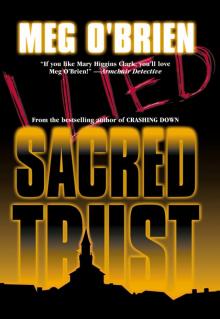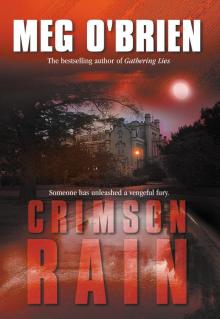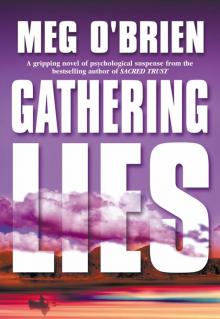- Home
- Meg O'Brien
Crimson Rain
Crimson Rain Read online
“I don’t know why you think I’ve seen Angela,” he said in as steady a tone as he could manage, “but even if I had, I’m your father, Rachel. I don’t have to report to you.”
“Obviously not,” she said, “given the number of times I’ve heard from you since summer.”
He stared. “Is that what’s really bothering you? Rach, I thought you were just as busy as I’ve been. I didn’t think you’d miss hearing from me. I’m sorry. Really, I am.”
“Oh, for heaven’s sake!” Rachel said. “It’s not about the e-mail, Dad. It’s about all those years when you didn’t have time for me because you were so busy fawning over Angela. You think that didn’t hurt? You think kids don’t see those things, no matter how young they are?”
“Rachel, that was years ago. Why are you bringing it up now? I thought—God, all that time working with Victoria, and you’re still hurting about those things? What does it take for you to get over it?”
“Maybe not having it start all over again,” she snapped. “Maybe getting her out of our lives once and for all!”
“If you like Mary Higgins Clark, you’ll love Meg O’Brien!”
—Armchair Detective
Also available from MIRA Books and MEG O’BRIEN
GATHERING LIES
SACRED TRUST
CRASHING DOWN
MEG O’BRIEN
CRIMSON RAIN
ACKNOWLEDGMENTS
Many thanks to…
Cathy Landrum, for her valuable research, and to Al Wilding, retired Seattle police officer, for checking my police scenes for accuracy.
Immeasurable thanks and love to my family, who generously helped me to finish this book during a period of immobility by shopping for me, cleaning for me, running to the post office, keeping my computer going and even seeing to it that my birds in the garden got fed. Bless you all…Kevin, Robin, Kaiti, Greg, Darrell, Tiffany and Scott. Thanks also to Peggy, who makes me proud, and to her mom, Amy, who recently put herself through college and deserves huge huzzahs! Finally, a very special hug and kiss to Courtney and Jonathan, whose visits add light to our lives, and to Emily, the “Little One,” who helps by just being here and keeping me laughing!
It seems I thank my MIRA editors in every book, but that’s only because I love every one I’ve ever worked with. Many thanks to Dianne Moggy and Amy Moore-Benson, and this year in particular to Miranda Stecyk, my editor through the Crimson Rain revisions. Her insight, hard work and enthusiastic support for this book made the job of revising seem easy, at a time when I wondered if I’d ever be able to finish.
Finally, I extend my utmost gratitude to my many wonderful readers who have written such beautiful letters about my books, and whose support for my writing keeps me going. Please stay in touch. I value each letter and e-mail, and even if my writing schedule keeps me from answering each one, I will always treasure your kind words. You can reach me now in two ways: by e-mail ([email protected]) or through my Web site (www.megobrien.com).
Contents
Prologue
Chapter 1
Chapter 2
Chapter 3
Chapter 4
Chapter 5
Chapter 6
Chapter 7
Chapter 8
Chapter 9
Chapter 10
Chapter 11
Chapter 12
Chapter 13
Chapter 14
Chapter 15
Chapter 16
Chapter 17
Chapter 18
Chapter 19
Chapter 20
Chapter 21
Chapter 22
Chapter 23
Epilogue
Prologue
Seattle, Washington
Christmas Eve, sixteen years ago
Life, some say, is only an illusion—an illusion we create ourselves, in our own minds, then project onto the screen of our days. Paul Bradley would wonder, later, if he had indeed, by some strange quirk of mind, created the hellish thing that happened to his family that long-ago Christmas Eve. Until then, he and Gina had seemed to have so much going for them. How, in one devastating moment, could it all have fallen apart?
A miracle might have saved them. Miracles, some say, are another thing we create ourselves. By choice, they say, we abide in either heaven or hell.
Paul might have made different choices in the years to follow. Gina might have, too. Neither of them could possibly know, however, the evil that lay in wait for them. Nor did they know that by the simple matter of making different choices, they might have been spared.
The vicious act that brought everything to a head—though no one could say it was the “true beginning”—took place sixteen years ago on a night that was supposed to be holy, but into which crept the very soul of sin. Paul Bradley stood that night with Gina, his wife of six years, in the kitchen of their historic home on Queen Anne Hill. Larger and with more property than most on the hill, it had the kind of architectural appointments the Bradleys loved. Finding it on Queen Anne Hill, one of the oldest and most desirable areas in Seattle, had been a bonus. Though some referred to the hill these days as a queen in a faded petticoat, there was talk of future gentrification on Lower Queen Anne. New and luxurious homes, apartments and businesses were going up every day.
The Bradleys had chosen this particular house because it stood in a quiet area above the fray and had a fabulous view. On good days they could see the Sound and most of West Seattle. On foggy days, the top of the Space Needle seemed to float on the clouds, like a hovering spacecraft or a ship at sea.
Never had Paul felt so content with the way his life had turned out. He had his own business, selling antiques to millionaire software executives, and Gina was on her way to becoming a successful interior designer. The Life Plan they had put down on paper before they married was working out—albeit with a few glitches here and there.
One of those glitches was that Gina hadn’t been able to have children, something they had discovered shortly after they married. Since they both wanted a family, and the sooner the better, they saw no reason to wait before adopting. Rachel and Angela, fraternal twins, had come into their lives one warm August day when they were a year old, about the same time as Paul and Gina’s first wedding anniversary. It seemed the Bradley family was now complete.
To be honest, there had been a few rough moments in the past year with Angela, who had shown signs of anger and hostility that seemed unusual for a four-year-old. Paul and Gina had been warned by the psychiatrist at Saint Sympatica’s orphanage that the girls might have problems due to a lack of sufficient maternal bonding in their first months. They had been left on the steps of the orphanage nine months before the adoption, with nothing but a note saying that they were three months old and their names were Rachel and Angela. Nothing was known about their mother, the psychiatrist had told them.
Though the twins were not identical, they both had brown hair and clear hazel eyes that seemed to connect with Gina and Paul from the first time they held them. The Bradleys had fallen in love with them on sight, and readily agreed to provide them with all the professional care they might need.
Everything had seemed fine until, at the age of four, Angela had begun to exhibit symptoms of what Victoria Lessing—the Seattle psychiatrist they had taken her to—tentatively labeled as RAD: Reactive Attachment Disorder. Angela seemed to have no real feelings for people, and no remorse when she hurt someone, as children often did while playing. Victoria had continued to work with Angela, often including Paul, Gina and Rachel in the sessions. The therapy had seemed to be helping, and in recent months they had actually begun to relax with their child.
As for Rachel, they thanked God that she had always been quiet and shy, showing no signs of RAD.
“You might want to keep an eye on Rachel,” Victoria had cautioned. “This kind of thing can suddenly appear in the teens, and even later.”
So far, so good, Paul thought that Christmas. Angela seemed to be getting better, while Rachel still showed no signs of the kind of syndrome Angela suffered from. Gratefully he took Gina into his arms, and together they listened to the sounds of carols on the stereo in the living room, the twins making small noises as they played around the Christmas tree.
“How did we get so lucky?” Paul murmured against his wife’s hair. She smelled of apples and cinnamon, and he loved her more than life itself. He wanted to take her to bed right then and there, and thought: If we could just get the girls in bed early…
That probably wouldn’t happen, of course. They were too excited about Santa coming. Paul was looking forward to it, too. The twins were at an age where they understood the Santa Claus story, and he and Gina looked forward to getting up in the morning and seeing their delight over the toys Santa had brought them.
Paul smiled and slid his lips down to Gina’s, pulling her against him and rocking slightly back and forth. Excitement began to build in him, and he could feel her shudder and melt, her arms tightening around his neck as their lips moved. He took her tongue inside his mouth and began the gentle searching that he knew would send her over the top. Gina’s arms tightened and she pressed herself so close there was little room left to breathe.
She did that, Paul knew, when she began to feel weak with arousal, hanging on to him as if to an anchor. He loved that feeling, the one of being needed, and his own arousal became a growing force, taking him over. Neither of them heard as the noises from the twins in the living room became louder and more intense.
The crash brought them back. That, and Rachel’s earsplitting scream.
“Good God, what did they do now?” Gina half laughed as she pulled away from Paul’s arms and ran for the kitchen door. Paul was close behind her, but was caught up short as Gina stopped in her tracks, her hands going to her mouth, eyes wide.
“No!” she screamed, running toward the twins.
Paul couldn’t say, later, if he’d fully understood what was going on. The tableau that met his eyes was too shocking, too unbelievable.
The eight-foot Christmas tree had been knocked over and lay on its side, surrounded by puddles of water. Ornaments had fallen off and broken; fragile shards were scattered everywhere. Foil icicles glittered on the carpet, and the toy train beneath the tree had jumped its tracks.
Angela, in her white Christmas dress with its bright red sash, stood over her sister, a sharp kitchen knife in her hand. Rachel lay on her back on the floor, her arms up in a feeble attempt to fend her sister off. Her screams cut into Paul, sending pain straight through him.
Angela never looked up, nor showed any sign at all that she’d heard when Gina yelled out, running toward her. Paul ran, too, but felt as if he were moving in slow motion. His legs were like lead, and his mind could barely take in what he was seeing.
Before they could reach her, Angela thrust the knife down. Paul somehow miraculously moved ahead of Gina and barreled into Angela, pushing her to the ground and wresting the knife from her hand. She fought him with the ferocity of an animal, her teeth biting into his arm, feet kicking at his groin.
Paul closed his mind to the red-hot pain and held his ground. Looking back quickly, he saw that Gina knelt beside Rachel and was holding the child in her arms. Blood seeped through Rachel’s pink Christmas dress and onto Gina’s blouse.
In the background, carols continued to play. “Joy to the world, the Lord is come…”
Paul looked down into Angela’s five-year-old hazel eyes and saw nothing but evil there. No fear, no remorse. Their color now seemed darker than her hair—huge, black orbs filled with hatred. She opened her mouth and spit into his face.
Paul’s heart plummeted to his feet. To him, it seemed as if Satan, not the Lord, had arrived that night.
1
Seattle, Washington
December 20, sixteen years later
She walked into the bedroom dressed in a gold satin gown so tight Paul could see every sinewy muscle as she moved toward him. Her hips swayed, and she touched the tip of a finger to her mouth, wetting it, then pushing it farther in, sucking on it as her eyes met his in a familiar promise. The fabric of the dress was so thin, so tight, it was little more than gold sweat outlining her breasts and the deep V between her thighs.
God, she looked good. How many hours a day did it take to stay in such great shape?
Momentarily he thought of Gina, his wife, and felt a pang of remorse. He remembered the way they had been together the first year of their marriage.
But that was more than twenty years ago, and no matter how hard they had tried to hold things together, no matter how they had honestly wanted it, nothing had been the same since that terrible Christmas when Angela…
As fast as the thought came, Paul turned it off. He had learned to do that—to compartmentalize and not dwell on the bad times. Instead he turned his attention to his groin, and the fact that he was growing hard. It was almost painful, the excitement his mistress, Lacey, could invoke in him by the merest look. It was a good pain, though, telling him he was still alive. Rational thought flew out the window as she reached the side of the bed and raised one long, slender leg, straddling him. Leaning down, she swept his cheeks with her waist-length blond hair, teasing and laughing softly as her full breasts nearly fell out of their satin shield.
Paul reached up and yanked the low-cut neckline apart, his arousal intensifying as he heard the buttons pop, the thin fabric rip. Lacey gave a soft laugh. He had bought her the gown so that he could do this, playing out a fantasy that Lacey enjoyed. He could never bring himself to actually hurt her, nor did she ask for that. This pretense at roughness had become part of their foreplay, one his mistress had suggested, and the lingerie was a one-time purchase he could well afford. She threw back her head, shaking her hair in buttery waves as her body began to move over his. Reaching for him with one hand, she slid him inside her while remaining upright and giving him access to her breasts. Rocking back and forth, she moaned.
The tightness in Paul’s throat grew as he grabbed her breasts firmly, the way she liked it. Squeezing her nipples until they were stiff, hard nubs he could fix his mouth around, he stroked the soft fullness of them, letting the feel of her overtake him until all coherent thought left his mind. Only a blank slate was left. A blank slate with nothing written on it—no unhappy past, no painful present, no pallid future.
When it was over, it was as if a job had been done, a commitment met, if only to himself. He had managed to hold the memories at bay.
Spent, Paul stared at the ceiling. For three months, holding the bad memories at bay had been Lacey Allison’s only job. He had rescued her from a string of temporary positions as an assistant to various Seattle CEOs and had put her up in this luxury apartment. For the past three months she had waited for him every evening, whether he was able to come here or not. Even during the day, when she went out to shop, she would take a cell phone with her so that he could reach her at any time. This, too, was her suggestion. She wanted to be with him every possible moment.
As for Paul, from the day he’d made the decision to be with her—unthinkable up until then—he couldn’t get enough of her. He wanted to drink her down, make her a part of him that would never leave, never go.
He reached for her, and this time an aeon passed that he wouldn’t remember later. He had gone into another world, a world where nothing mattered, not even the sex. Lacey did that for him. She took him to that blank slate where, for a few moments, at least, nothing existed—not even Lacey herself.
Gina Bradley opened her front door and stood for a moment, listening for signs of movement. Shifting the bags of groceries in her arms, she shook her head and sighed. For heaven’s sake, who did she listen for?
Certainly not Paul. It was only five, and he h
ad been coming home later and later these past few months. In the beginning, she would hold dinner for him, warming it in the oven at seven, eight, nine. In recent weeks she hadn’t bothered, taking a sandwich for herself up to their room and watching television or reading until he came home. Often it was after midnight when she would hear his car pull into the driveway. The Infiniti’s headlights would sweep the room quickly, leaving as faint an impression as Paul’s presence when at last he would tiptoe quietly into the bedroom with a mumbled apology.
His excuse, always, was that he’d been working late, and Gina had no reason not to believe it. Paul became moody and withdrawn every year before the Christmas holiday. Losing little Angela sixteen years ago had changed her husband in ways even she couldn’t comprehend.
Not that she herself didn’t still miss the child. But it was a long time ago, and Gina had tried to move on, to build a career she could exist inside, like a hermit crab. If her work as an interior designer didn’t always satisfy, she accepted that as natural, given the circumstances. Losing a child—even a child one had adopted and lived with for only four years—had left a hole in her heart. Not just a break, the kind country-western songs were written about, but an actual hole as seen in medical journals, the kind that led to death, or at the very least, drastic surgery.
For a while, Gina and Paul thought that, because of their grief, they might actually die. However, they had somehow pulled themselves together and had been saved—if saved was the right word—by the surgical removal of memories. Clean, antiseptic cuts were called for, as in the giving away of clothes and toys, the burning of photographs, the removal of everything that might remind them of Angela.
Everything, that is, but Rachel, her twin.
They had wished for identical twins at first, little girls they could dress in the same outfits, a cutesy look that would have people stopping in the street to coo over two-seater strollers and rhapsodize, “Oh, how precious.” They came to be grateful, however, that Rachel and Angela had been fraternal twins instead. The fact that they didn’t look alike helped after Angela was gone. And as Rachel grew, she took on more of Gina’s and Paul’s traits, so that eventually the reminders of Angela were diluted in that way, as well.

 The Last Cheerleader
The Last Cheerleader Sacred Trust
Sacred Trust The Final Kill
The Final Kill Crimson Rain
Crimson Rain Gathering Lies
Gathering Lies